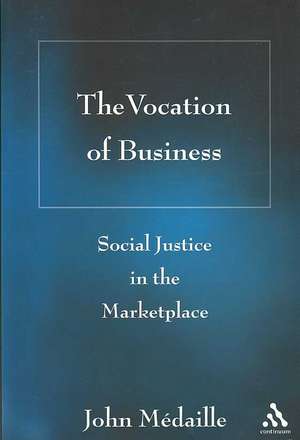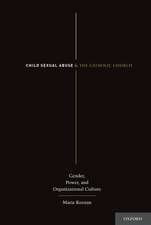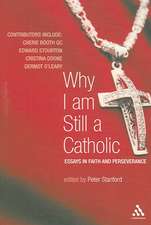The Vocation of Business: Social Justice in the Marketplace
Autor John C. Médailleen Limba Engleză Paperback – 24 iul 2007
This is a textbook on the Social Teaching of the Roman Catholic Church for would-be business professionals. Part I does 3 things: provides (1) a history of moral discourse since the Enlightenment, (2) a history of economic thought from Aristotle and Aquinas to Ludwig Mises and Milton Friedman , and (3) a history of property. Part II provides a close reading of 3 major social encyclicals. Part III examines the tensions between Catholic social teaching and neoclassical economics. Part IV explores 5 case studies of the actual implementation of Catholic-like social teaching. The over-riding theme of the book is that the original unity of distributive and corrective justice that prevailed in both economics and moral discourse until the 16th and 17th centuries was shattered by the rise of an "individualistic" capitalism that relied on corrective justice (justice in exchange) only. The rise of individualistic business practice was paralleled by a movement in moral thinking from a discourse of virtue and the common good to a discourse of utilitarianism and "emotivism"; individual preference became all that mattered, and only the market is capable of correlating individual preferences. An economics that lacks a distributive principle will attain neither equity nor equilibrium and will be inherently unstable and increasingly reliant on government power (Keynesianism) to correct the balances. Catholic social teaching emphasizes equity in the distribution of land, the means of production, and a just wage.
Preț: 540.65 lei
Preț vechi: 731.77 lei
-26% Nou
Puncte Express: 811
Preț estimativ în valută:
103.45€ • 108.01$ • 85.62£
103.45€ • 108.01$ • 85.62£
Carte tipărită la comandă
Livrare economică 05-19 aprilie
Preluare comenzi: 021 569.72.76
Specificații
ISBN-13: 9780826428097
ISBN-10: 0826428096
Pagini: 374
Dimensiuni: 157 x 227 x 28 mm
Greutate: 0.56 kg
Editura: Bloomsbury Publishing
Colecția Continuum
Locul publicării:New York, United States
ISBN-10: 0826428096
Pagini: 374
Dimensiuni: 157 x 227 x 28 mm
Greutate: 0.56 kg
Editura: Bloomsbury Publishing
Colecția Continuum
Locul publicării:New York, United States
Caracteristici
Lucid, comprehensive textbook in a field (Catholic social teaching) that has few resources
Cuprins
Part I: Historical Background 1: Justice and Economics 2: The Modern Moral Dialogue 3. Justice in Economic History 4. The Disappearance of Justice 5. Property, Culture, and Economics Part II: The Social Encyclicals 6. Rerum Novarum: A Scandalous Encyclical? 7. Laborem Exercens: Work as the Key to the Social Question 8. Centesimus Annus: The Uncertain Victory Part III: Toward an Evolved Capitalism 9. The Social Teachings and Economics: Ideas in Tension 10. Toward an "Evolved" Capitalism 11. Marginal Productivity and the Just Wage 12. The Neo-Conservative Response 13. Distributivism Part IV: The Practice of Justice in the Modern Business World 14. Taiwan and the "Land to the Tiller" Program 15. Development and Globalization 16. Micro-Banking 17. The Mondragon Cooperative Corporation 18. ESOP's and Profit Sharing 19. The Just Wage in the Corporation 20. The Vocation of Business
Recenzii
"... John Medaille has written a most interesting book, The Vocation of Business: Social Justice in the Marketplace. Medaille, a successful businessman who teaches in the Business Leadership program at the University of Dallas, traces the history and development of economic theory, examines the contribution of the Catholic social encyclicals, explains and critiques the evolution of contemporary capitalism, and provides both the theoretical underpinning and concrete examples for the successful 'practice of justice in the modern business world.' "...I found the text both informative and fascinating.... The author has a great gift for exposing the intersection of economic theory and human values. He demonstrates again and again the unfortunate consequences of theories which depend on the wrong values, or which deny (naively) that they depend on any values at all. "Medaille ultimately demonstrates that some form of distributism (remember Chesterton and Belloc?) is essential for the proper operation of free enterprise in such a way that it actually expands prosperity, rather than progressively constricting it to a smaller and smaller group. In fact, he argues persuasively that an initial widespread distribution of ownership is necessary for capitalism to work at all. He adduces a long history and clear economic affairs leads directly to economic equilibrium, which is critical for human flourishing, and so should be a preeminent goal for any culture. "Students of economics should read this book as a corrective to the false claims of many theories to be scientific, immutable and value-free. Businessmen should read it for both a better understanding of their calling and the inspiration to make important contributions to the larger culture precisely through their business activity. Professors of economics and business may very well wish to make the book required reading. In fact, anyone who wonders about production, exchange and modern economic inequities will find in this book a highly intelligent treatment of how we got where we are, and what the way forward should be. "Even in the United States, the sphere of prosperity is steadily shrinking, the gap between rich and poor is widening, and the purchasing power of most citizens is artificially sustained by borrowing heavily against the future. For these reasons alone, it is none too soon to read The Vocation of Business."- Dr. Jess Mirus, Catholic Culture, August 7, 2007
"A highly original, intriguing and challenging book...This book is so rich and wide-ranging that any brief synopsis easily dilutes its strengths. The Vocation of Business offers a feast to chew on."--America
"A highly original, intriguing and challenging book...This book is so rich and wide-ranging that any brief synopsis easily dilutes its strengths. The Vocation of Business offers a feast to chew on."--America









